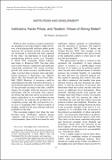Institutions, Factor Prices, and Taxation: Virtues of Strong States?
Author(s)
Acemoglu, Daron
DownloadAcemoglu_Institutions factor.pdf (146.7Kb)
PUBLISHER_POLICY
Publisher Policy
Article is made available in accordance with the publisher's policy and may be subject to US copyright law. Please refer to the publisher's site for terms of use.
Terms of use
Metadata
Show full item recordAbstract
While in a few societies economic institutions
are designed to provide property rights protection,
a level playing field, and basic public goods
necessary for economic growth, in many they
are structured to maximize the rents captured
by the “elite,” the individuals or social groups
monopolizing political power (e.g., Douglass
C. North 1981; Acemoglu, Simon Johnson,
and James A. Robinson 2005. The elite often
choose entry barriers, regulations and inefficient
contracting institutions that retard economic
growth and create resource misallocations in
order to protect their economic rents and redistribute
resources to themselves (e.g., Mancur
Olson 1982; Per Krusell and Jose-Victor Rios-
Rull 1996).1 However, if resources could be
redistributed to the elite with fewer distortions, a
more efficient allocation of resources, with (part
of) the proceeds accruing to the elite, could be
chosen. For example, when the necessary fiscal
instruments and the associated state capacity
are absent, the elite may choose economic institutions
and policies so as to redistribute income
to themselves by reducing the productivity of
competing groups and thus manipulating factor
prices (Acemoglu 2007). Direct taxation, if
feasible, would be both more efficient and more
profitable for the elite.
This reasoning suggests that when the state
becomes more “developed,” achieves greater
“capacity,” and has access to a larger set of fiscal
instruments, there will be less need for such
1 A second, perhaps more important reason is that the elite
may be afraid that a more efficient allocation of resources
will reduce their political power and their future ability to
obtain rents (e.g., Acemoglu and Robinson 2000, 2006).
Institutions and Development †
Institutions, Factor Prices, and Taxation: Virtues of Strong States?
By Daron Acemoglu*
inefficient, indirect methods of redistribution
and the allocation of resources will improve
(e.g., Acemoglu 2007; Timothy J. Besley and
Torsten Persson 2010). The example of the
development of the English state and economy
in the eighteenth century is often used to support
this presumption.
This paper points out that, in contrast to this
argument, the availability of more efficient
means of taxation is a double-edged sword
because of its impact on the political equilibrium;
because more efficient means of taxation
increase the potential benefits of controlling
the state, they may also intensify political conflict
aimed at capturing this control. This indirect
effect counteracts the benefits from more
efficient taxation and may dominate the direct
effect, so that the allocation of resources may
deteriorate when the society and the state have
access to additional fiscal instruments. More
generally, although greater state capacity and
stronger states may bring a variety of economic
benefits, they will also increase the value of
controlling the state and thus induce increased
political conflict and infighting. Therefore, the
virtues of strong states emerge when the increase
in the economic strength of the state is a consequence
of, or coincident with, an increase in
the political accountability of rulers and politicians—
not necessarily when there is an autonomous
increase in the fiscal capacity of the state.
Date issued
2010-05Department
Massachusetts Institute of Technology. Department of EconomicsJournal
American Economic Review
Publisher
American Economic Association
Citation
Acemoglu, Daron. “Institutions, Factor Prices, and Taxation: Virtues of Strong States?.” American Economic Review 100.2 (2010): 115-119.
Version: Final published version
ISSN
0002-8282
